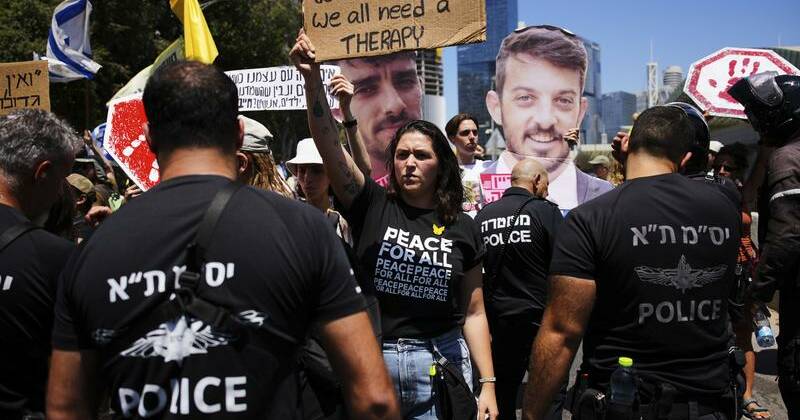
Thousands of Israelis participated in a nationwide strike, demanding an end to the ongoing war and urging Prime Minister Benjamin Netanyahu to reach an agreement with Hamas for the release of hostages held in Gaza. Demonstrators displayed Israeli flags and carried photos of the captives as they rallied in various cities across the country. Whistles, horns, and drums filled the air while some protesters blocked major roads, including the critical route between Jerusalem and Tel Aviv.
In a public square in Tel Aviv, Anat Angrest, the mother of hostage Matan Angrest, emphasized the importance of life, stating, “Today, everything stops to remember the highest value: the sanctity of life.” Some businesses and institutions showed solidarity with the families of hostages by allowing employees to join the strike, although many remained open on what is generally a working day in Israel. Schools are currently on summer recess and were not impacted. A significant rally was scheduled for the evening in Tel Aviv.
Israeli police reported that 38 demonstrators were detained as tensions escalated between protesters and law enforcement during the road blockages. Yair Lapid, leader of the opposition and a participant in the Tel Aviv rally, expressed his support for the demonstrators, stating, “The only thing that strengthens the country is the wonderful spirit of the people who are going out from home today for Israeli solidarity.”
Conversely, Netanyahu criticized those calling for an end to the war without defeating Hamas, arguing that such demands “only harden Hamas’ position and delay the release of our hostages.” He warned that these calls could lead to the repetition of the horrors witnessed on October 7, 2023, when Hamas launched a significant attack on Israel. The Prime Minister underscored his government’s commitment to seizing Gaza City, a strategic area that remains outside Israeli control. This military strategy faces considerable opposition from both the public and families of hostages, who worry that an intensified military campaign could jeopardize their loved ones’ safety.
Currently, there are approximately 50 hostages believed to be held by militants in Gaza, with Israeli officials estimating that around 20 are still alive. After nearly two years of conflict triggered by the October 7 attacks, most hostages released thus far were freed through diplomatic negotiations. However, efforts toward a ceasefire that could facilitate further releases collapsed in July. Hamas has stated it will only release the remaining hostages if Israel agrees to halt its military actions, while Netanyahu insists that Hamas must be eliminated from power.
The Israeli government is facing significant scrutiny from both domestic and international communities, including criticism from several European allies, regarding its decision to focus military efforts on Gaza City. In response to these developments, Hamas condemned the plan as criminal, warning it would lead to the displacement of hundreds of thousands of people.
According to local health officials, over 61,000 Palestinians have been killed in the Israeli military campaign in Gaza, with at least 29 fatalities reported in the last day alone. The conflict has also seen substantial Israeli losses, with around 1,200 people killed and 251 abducted during the October 7 assault. Additionally, over 400 Israeli soldiers have died in the ongoing military actions in Gaza.
The situation remains fluid, with both sides entrenched in their positions as protests continue across Israel.







